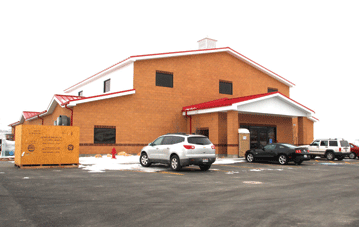
MONA SEWER PLANT • Mona's new sewer plant is now finished and undergoing testing.
By Myrna Trauntvein
Times-News Correspondent
The new Mona sewer treatment facility is operating and a dedication of the system will be planned for the future.
"The plant has been running with clear water," said Bill Mills, mayor.
The membrane bioreactor system that Mona is using, combines proven ultrafiltration technology with biological treatment for municipal wastewater treatment and water reuse applications.
Membrane bioreactor systems replace conventional treatment and combine clarification, aeration and filtration into a simple and cost-effective process that reduces capital and operating costs. The result is consistent, high quality effluent suitable for any discharge or reuse application.
The plant opened, officially, on Tuesday, February 21.
On Monday, President's Day, the plant was officially seeded with the needed bacteria to make the plant function properly. If more of the bacteria were needed, Payson had said that they would be happy to help.
Aerobic bacteria operate in wastewater treatment systems that supply a readily available amount of oxygen. These bacteria consume organic waste and oxygen, and they expel water and carbon dioxide as waste products.
Jonathan Jones, council member, said he had been asked by a resident if the homeowner's septic system, which had been used as a means of wastewater treatment, could be dumped into the system.
"That cannot happen," said Mills. "It will ruin our system."
Mills said that homeowners should treat their sewer connection to the city's system as they had treated their former septic tanks.
The term "septic" refers to the anaerobic bacterial environment that develops in the tank and that decomposes or mineralizes the waste discharged into the tank.
Strictly speaking, the terms "aerobic" and "anaerobic" refer to the presence and absence of oxygen, respectively. Aerobic bacteria prefer to get their energy by using oxygen to fuel metabolism.
"We will plan a dedication once we know that the plant is running as it should," said Mills. "There may be a few glitches or bugs that we need to iron out when we first begin."
One thing residents needed to remember, said Mills, was that the sewer system needed to be used as was the old septic system.
There are lots of things a homeowner, as a user of the system, can do to ensure it remains in good working order.
The tips below provide advice on what can be done to protect the sewer system from harsh chemicals, and keep pumps and manholes from becoming clogged or damaged by foreign objects. Because most sanitary sewer blockages occur between a house and the sewer main, following these simple tips can also help prevent a sewer line back-up in the home.
Scrape excess grease into a container and dispose of it in the garbage. Collect larger amounts of fats and oils in a heat-proof container and freeze before disposing in the garbage. This keeps the grease from making a mess in the garbage collection can. Place food scraps in waste containers or garbage bags for disposal with solid wastes and scrape off dishes prior to washing. Pour fats, oils, and grease from cooking down the sink drain. If pots and pans are only greasy, don't rinse them; just wipe them out with a paper towel.
Place a wastebasket in the bathroom to dispose of solid wastes. Disposable diapers and personal hygiene products do not belong in the sewer system. Never flush diapers, convenience pads, surgical bandages, syringes, cotton-tipped stems, pantyhose or other such items down the toilet.
Use a strainer over the plughole in the sink, tub and shower. Empty the collected material into the garbage.
Use the manufacturer's recommended amount of detergent for washing up in the kitchen or laundry. The average household uses three times more detergent than manufacturers recommend for washing dishes and clothes. When these detergents enter the sewer system, they hold large amounts of oil, grease, and fats in suspension making cleaning and treating the waste water more difficult. By cutting down on the amount of detergent used, there'll also be less phosphate in the environment.
Never pour paint, engine oil, pesticides or chemicals down the sink. (Don't try to burn them, either.) This isn't only because of the threat of these hazards getting into the environment; but also because these chemicals pose a health threat to maintenance staff working in the sewers.
Never place jewelry and valuables on the edge of a basin or sink. Once dropped down a drain or flushed down the toilet, valuable and valued items are very difficult to recover. Also, take care not to drop other items such as dentures and wallets into the toilet.